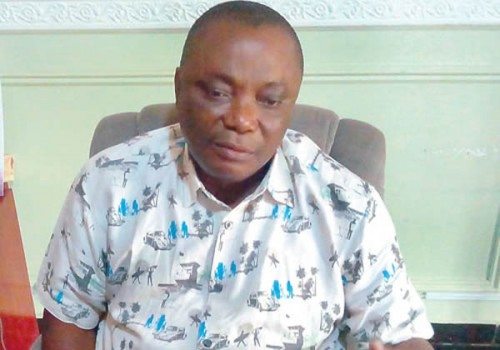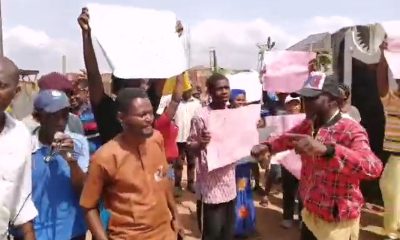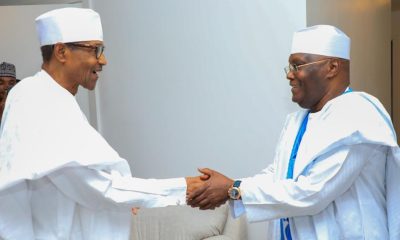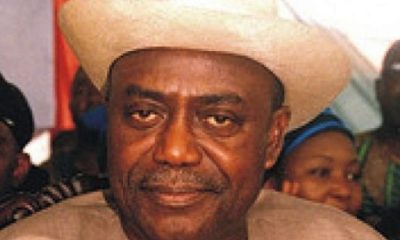News
Supreme Court orders release of Senator Nwaoboshi from prison

Supreme Court orders release of Senator Nwaoboshi from prison
The Supreme Court on Friday quashed the seven-year jail sentence slammed on Senator Peter Nwaoboshi.
The apex court invalidated the money laundering charge the Economic and Financial Crimes Commission, EFCC, preferred against the lawmaker.
It ordered his immediate release from prison custody.
Nwaoboshi who represented Delta North Senatorial District was sentenced to seven years imprisonment on July 1, 2022 the Court of Appeal in Lagos.
He was convicted on two counts (charges) the EFCC brought against him.
The appellate court also ordered that his two companies – Golden Touch Construction Project Ltd and Suiming Electrical Ltd – be sealed.
However, the Supreme Court, in a split decision of four-to-one, nullified the judgement of the appellate court.
It upheld the initial verdict of the Federal High Court in Lagos State, which discharged and acquitted the embattled former lawmaker of the charge against him.
The apex court, in its lead judgement delivered by Justice Emmanuel Agim, upturned the appellate court’s decision against Nwaoboshi’s companies.
The EFCC had alleged that Nwaoboshi and his companies illegally acquired a property named Guinea House on Marine Road, in Apapa, Lagos, for N805m, which belonged to the Delta State government.
News
Tinubu: Presidency reacts to US court order, says president not investigated by CIA

Tinubu: Presidency reacts to US court order, says president not investigated by CIA
A United States District Court in Columbia has ordered the Federal Bureau of Investigation, FBI, and the Drug Enforcement Administration, DEA, to release records relating to the criminal investigation of President Bola Tinubu over alleged drug trafficking.
Judge Beryl Howell, in a ruling dated April 8, which can be found on the court’s website, directed both agencies to search for and process non-exempt records tied to Freedom of Information Act, FOIA, requests filed by American researcher Aaron Greenspan.
But the Presidency in a swift reaction, said the US court didn’t indict the President, adding that he was not also investigated by the Criminal Investigation Agency, CIA.
Greenspan, founder of legal transparency platform, PlainSite, had submitted 12 FOIA requests between 2022 and 2023, seeking information on a Chicago drug ring that operated in the early 1990s.
His request included records on Tinubu and three others, including Lee Andrew Edwards, Mueez Abegboyega Akande and Abiodun Agbele.
The FBI and DEA had previously issued “Glomar responses”—a refusal to confirm or deny the existence of requested records—but the court ruled that such responses were improper in this case.
The FBI and DEA have now been ordered to conduct a search and release non-exempt materials, while the parties are to report back to the court on the case’s status by May 2, 2025.
READ ALSO:
- JUST IN: Two rescued in Lagos building collapse
- Salah stars again as Liverpool move closer to Premier League title
- Police bust car theft syndicate in Abuja, arrest suspects
The judgment read: “The FBI and DEA have both officially confirmed investigations of Tinubu relating to the drug trafficking ring.
“Any privacy interests implicated by the FOIA requests to the FBI and DEA for records about Tinubu are overcome by the public interest in release of such information.
“Since the FBI and DEA have provided no information to establish that a cognizable privacy interest exists in keeping secret the fact that Tinubu was a subject of criminal investigation.
“They have failed to meet their burden to sustain their Glomar responses and provide an additional reason why these responses must be lifted.”
The court upheld the CIA’s Glomar response after Greenspan conceded that the agency had acknowledged the existence of responsive records.
The judge ruled, “For the reasons discussed above, plaintiff is entitled to summary judgment as to each of the four Glomar responses asserted by defendants FBI and DEA, while defendant CIA is entitled to summary judgment, since its Glomar response was properly asserted.
“Accordingly, the FBI and DEA must search for and process non-exempt records responsive to the FOIA requests directed to these agencies.
“The CIA, meanwhile, is entitled to judgment in its favour in this case. The remaining parties are directed to file jointly, by May 2, 2025, a report on the status of any outstanding issues in this case, as described in the accompanying order.”
US Court didn’t indict Tinubu — Presidency
Reacting to this yesterday, the Presidency said the reports did not indict President Bola Tinubu.
Special Adviser to the President on Information and Strategy, Bayo Onanuga, told Vanguard that there was nothing new that was revealed in the said reports.
He said the reports had been in the public space for more than 30 years, noting that President Tinubu was not investigated by the CIA.
He said: “There is nothing new to be revealed. The report by Agent Moss of the FBI and the DEA report have been in the public space for more than 30 years. The reports did not indict the Nigerian leader. And he was not investigated by the CIA.”
Tinubu: Presidency reacts to US court order, says president not investigated by CIA
News
JUST IN: Release files on Tinubu, US judge orders FBI, DEA

JUST IN: Release files on Tinubu, US judge orders FBI, DEA
A United States District Court in Washington, D.C., has directed the Federal Bureau of Investigation (FBI) and the Drug Enforcement Administration (DEA) to make public records concerning President Bola Tinubu.
Judge Beryl Howell issued the order on Tuesday in response to a motion filed by Aaron Greenspan, an American citizen seeking a review of a previous ruling.
In her decision, Howell dismissed the agencies’ justification for withholding the information, stating that shielding such documents from the public “is neither logical nor plausible.”
Greenspan alleged that the agencies violated the Freedom of Information Act (FOIA) by failing to produce documents regarding alleged federal probes into both President Tinubu and Abiodun Agbele within the legally mandated timeframe.
In 1993, Tinubu forfeited $460,000 to the U.S. government after officials linked the funds to proceeds from narcotics-related activities.
The issue resurfaced during proceedings at Nigeria’s Presidential Election Petition Court, where opposition candidates Atiku Abubakar and Peter Obi cited the forfeiture in challenging Tinubu’s eligibility for office. The court ultimately dismissed the petitions and upheld his election.
READ ALSO:
- Why we will work against Atiku in 2027 – Bauchi gov’s son
- 2027: Buhari loyalists, CPC threaten to leave APC, Tinubu worries
- FG stabilises grid with additional 700MW
Judge Howell’s latest ruling partially supports Greenspan’s claims, particularly concerning the agencies’ reliance on what’s known as a “Glomar response”—a refusal to confirm or deny the existence of records.
According to the judge, the FBI and DEA failed to demonstrate that their use of the Glomar principle was appropriate in this case.
She wrote, “the claim that the Glomar responses were necessary to protect this information from public disclosure is at this point neither logical nor plausible,” noting that Tinubu had already been publicly identified as a subject in investigations by both agencies.
Further explaining the legal framework, Howell stated that a FOIA requester can challenge a Glomar response either by disputing the claim that disclosure would cause identifiable harm, or by proving that the agency has already officially acknowledged the information in question.
In this instance, Greenspan made both arguments. He contended that: “The plaintiffs’ argument that (1) DEA has officially confirmed investigations of Agbele’s involvement in the drug trafficking ring, (2) the FBI and DEA have both officially confirmed investigations of Tinubu relating to the drug trafficking ring, (3) any privacy interests implicated by the FOIA requests to the FBI and DEA for records about Tinubu are overcome by the public interest in release of such information, and (4) the CIA has officially acknowledged records responsive to plaintiff’s FOIA request about Tinubu.”
JUST IN: Release files on Tinubu, US judge orders FBI, DEA
News
US envoy meets Tinubu in Paris over economic war

US envoy meets Tinubu in Paris over economic war
The United States has opened discussions with President Bola Tinubu on expanding economic cooperation across Africa as part of efforts to deepen trade, investment, and development ties on the continent.
This was disclosed following a meeting on Thursday between President Tinubu and U.S. State Department Senior Advisor for Africa, Massad Boulos, in Paris, where the Nigerian leader is currently on a short working visit.
According to a statement posted Friday on the official X (formerly Twitter) handle of the U.S. Mission in Nigeria, and shared by President Tinubu’s Special Adviser on Information and Strategy, Bayo Onanuga, the talks also touched on key security concerns in the region.
“State Department Senior Advisor for Africa Massad Boulos met with President Tinubu on Thursday to discuss regional security, including working together with partners to build a durable peace in eastern DRC,” the U.S. Mission stated.
“They also discussed expanding opportunities for economic cooperation throughout Africa,” it added.
The meeting comes at a time when Nigeria is working to reposition itself as a hub for investment and economic growth on the continent.
READ ALSO:
- 13 major Lagos markets shut down over waste violations
- Mohamed Salah pens new two-year deal at Liverpool
- Court orders FG to take over 7 properties of ex-FBN personnel
President Tinubu has consistently called for stronger global partnerships to drive industrialization, job creation, and infrastructure development in Africa.
Though specific details of the economic discussions were not disclosed, analysts say the meeting reflects growing American interest in engaging with African leaders on development-focused diplomacy, with Nigeria seen as a critical anchor in West Africa.
President Tinubu has been in Paris since Wednesday, April 2, undertaking a short working visit aimed at reviewing his administration’s midterm performance and setting strategic priorities for the next phase of his tenure.
While abroad, the President has remained actively engaged in state matters, and Thursday’s high-level engagement with the U.S. State Department underscores Nigeria’s central role in regional affairs and global economic conversations.
Tinubu is expected to return to the country shortly, with public attention focused on the outcome of his consultations and the anticipated direction of new policies in the coming months.
US envoy meets Tinubu in Paris over economic war
-

 metro2 days ago
metro2 days agoKidnapping: Our lives are hanging by a thread, residents of Igbogbo-Baiyeku communities in Lagos cry out
-

 International3 days ago
International3 days agoUS announces new visa requirements for Nigerian applicants
-

 International2 days ago
International2 days agoUS embassy announces new visa interview requirements for Nigerian applicants
-

 Sports2 days ago
Sports2 days agoBreaking: Former Super Eagles coach Christian Chukwu passes away at 74
-

 Sports3 days ago
Sports3 days agoCristiano Ronaldo ventures into movie industry, unveils new studio
-

 Politics3 days ago
Politics3 days agoAtiku leads Tambuwal, El-Rufai, others to Buhari as 2027 election draws near
-

 metro3 days ago
metro3 days agoIbadan Pastor ends 30-year-marriage over sex dispute with wife
-

 metro3 days ago
metro3 days agoKemi Olunloyo angry, disowns family after father’s death











